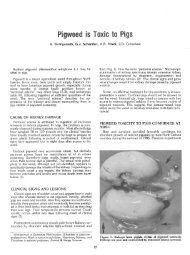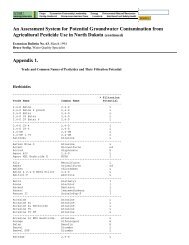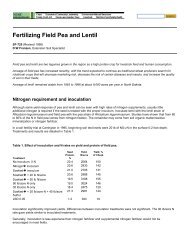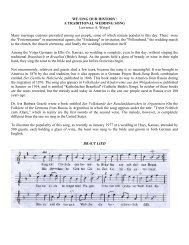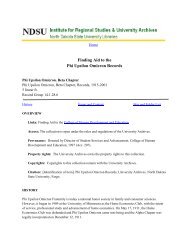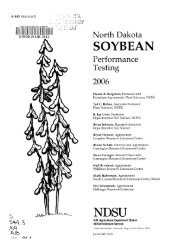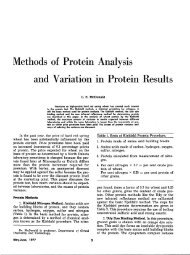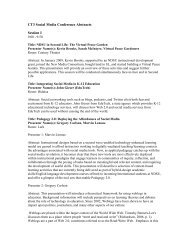GERMAN-RUSSIAN TRADITIONS By Lawrence Weigel Nicknames In
GERMAN-RUSSIAN TRADITIONS By Lawrence Weigel Nicknames In
GERMAN-RUSSIAN TRADITIONS By Lawrence Weigel Nicknames In
You also want an ePaper? Increase the reach of your titles
YUMPU automatically turns print PDFs into web optimized ePapers that Google loves.
John;" "Der eier John." The Frank Dreilings were "Der F.J.A. or Der Schulmester;" "Der linksa Frank;" "DerF.P.A. Dreiling;" "Der Gricka Margret ihra Frank;" "Der Frank P.M.;" "Der Frank S.;" "Der bucklicha Franz."There were three Mike Brungards and they were known as "Der Kattalgoets Mike," "Des milch Meikja," and"Der dicka Mike or Hardware Mike." Peter Sander was also popular, and the three that I knew were known as"Der Fiddel Pit" (the one who played the violin); "Der rota Pit" (he had red hair); "Der marshal Pit" (he was thecity marshal at one time). Another name which had to be distinguished were the John <strong>Weigel</strong>s. There was "DerJohn Pit" (even though his real name was John J.), "Der stilla Hans (he did not have a lot to say), and one wassimply called "Der John L"There are interesting stories connected with these nicknames. Joe Goetz of Hays whose family formerly lived inHerzog was identified by the name "Binder" and not the real name of "Goetz." His father's name was Peter, andone day - Joe told me - a man from Park, Kansas, came to Herzog on the old U.P. "Plug" (This was a smallpassenger train that people used to say stopped at every telephone pole). When he stepped off at the depot, heasked the first native Herzoger if he knew where Peter Goetz lived. "Nope," he said, "I never heard of the man."The Park visitor then said, "He has lived here all of his life; surely you must know him." He then met anotherman from Herzog and asked if he knew Peter Goetz. Again, the negative reply. Just then a man was comingtoward them and the Park man said, "Why there he is; that's him." The reply was, "That's not Peter Goetz; that's`Binder Peter.' "Two men were named Nick Kuhn. Their identifying names were: "Der Baltazers Nicklos." It so happened thatBaltazer was his grandfather's name, and all of his brothers were identified by their grandfather's name - usedahead of their own names. The other on was "Der Dicka Nick," and from the description you knew that he was aheavyset man.<strong>In</strong> Herzog my great-grandfather was known as "Der Pfeifers Halba." His name was John M. Pfeifer. I am toldthat this name was a result of an incident in Russia, when he was told "Now you are a man - so you must work.""Ne, ich sin blos a halber Mann," he replied - meaning I am only half a man as I am still a boy . . . and so thename "Der Halba" stuck for life. His son, John J. Pfeifer, was identified as "Der Fertel," meaning "quarter." <strong>In</strong>other words, the father was called "half' and his son "fourth."The Linenberger family had the name "Fisha" in front of the given names. There was "Der Dicka Fisha Josep;""Der Fisha Peter;" "Der Fisha Hans;" "Die Fisha Marie." This by-name came about 175 years ago whenHanjoerg Linenberger married a girl by the name of Fisher, and from that time on his descendants wereidentified this way. It can be seen that the "r" was dropped or slurred over.One of the Kuhn families in Herzog is identified as "Die Schmidts." There is "Der Schmidts Anton" (AntonKuhn); "Der Schmidts Grossa" (John Kuhn); etc. It is also possible that somewhere in the past agreatgrandfather might have been a blacksmith and the name came about that way. <strong>In</strong> German a blacksmith wascalled "A Schmidt."Name of Profession Used to Describe a ManThere was "Der Store Dreiling;" "Der Zahn Docktor" (Dreiling); "Der Barber" (<strong>Weigel</strong>); "Der Schuster"(Sander); "Der Telephone Tony" (Denning); "Der Elevator John" (Dreiling); "Der Postmeister" (FranzBrungardt); "Der Christians (Bona) Josep (Vonfeldt)."



